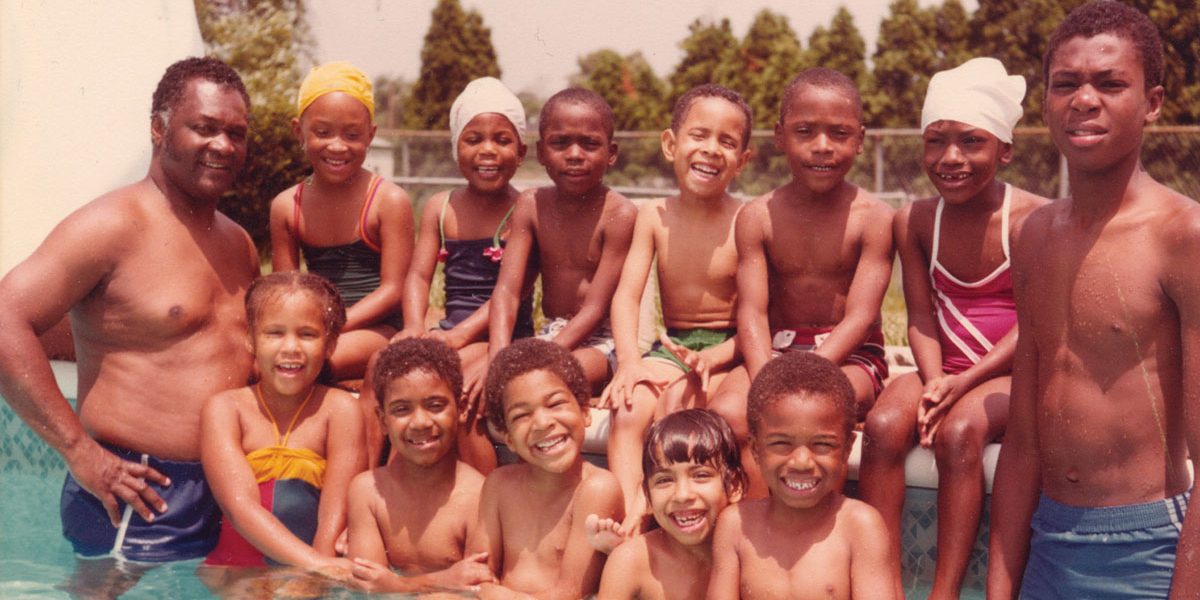Health & Wellness
Survival Skills
Marvin Thorpe teaches swim lessons in his Windsor Mill backyard.
For decades, pediatrician Ralph Brown noticed a difference between the white and Black children he saw. Nearly all the white kids in his Sinai Hospital practice learned to swim by age 7 or 8. “Not the case with African-American families,” says Brown. “I’m embarrassed to admit, it did not register what that meant until I saw a CDC report—maybe a half-dozen years ago—that Black children are five times more likely to drown than white kids.”
It also wasn’t until then, adds Brown, who recently retired, that he understood the statistic’s relationship to segregation and Jim Crow. “There were limited opportunities for their grandparents and great-grandparents to swim, and that legacy has been passed down,” Brown says. He began asking the parents of Black children who did know how to swim how they had learned. “And I kept hearing, ‘Mr. Thorpe.’”
Mr. Thorpe is the tall, skinny junior high schooler on the right in the above photo. His father, Marvin Thorpe Sr., whom he is named after, is the broad-shouldered man standing on the other side of the smiling kids in their backyard pool. The elder Thorpe, who once said he dreamt “of a day where there are no reports of a child drowning,” began offering swimming lessons behind their Windsor Mill beltway bungalow in 1972. He had managed to learn to swim in segregated Lynchburg, VA—by hounding local lifeguards—and developed a lifelong passion for the water. He died in 2004, at which point Marvin II took over the annual Memorial Day to Labor Day enterprise.
Together and separately, Thorpe, who is now 50, and his father have taught an estimated 15,000 people to swim over the past 46 seasons. Mostly, that’s been Black kids, but not all by any means. They’ve introduced three generations in some cases to swimming, including parents and grandparents who decided to learn after their children and grandchildren became swimmers. Former mayors Kurt Schmoke and Stephanie Rawlings-Blake brought their children to the Thorpes. So have the Mosbys—Marilyn and Nick, the city state’s attorney and state delegate, respectively—Ravens linebacker Terrell Suggs, and former Harlem Globetrotter Choo Smith.
“Word of mouth,” says Thorpe, getting the tidy 16-yard pool ready on a recent morning. “We’ve never done any advertising.”
His father’s first pupil, in fact, was his son, who nearly drowned in the family’s then-above-ground pool as a 4 year old. “My father was a physical education teacher in the city school system and coached swimming and tennis at Southwestern High for four years,” Thorpe says. “He taught me to swim the next day. He started teaching swimming in our backyard that summer, built an inground pool a few years later, and I was a part of it, helping him from day one.”
The popularity of the program did not manifest because of his father’s fun teaching style or teddy bear nature. The elder Thorpe was a taskmaster who did not allow parents to stay during lessons and was generally unmoved by children’s tears. “Dad could be very tough, even mean, I thought sometimes, but you did what he wanted. He didn’t think it should take longer than two weeks, two hours a day, to learn to swim,” says Thorpe. “But, at the end of those two weeks, he’d invite the parents to come afterward, and there’d be a Saturday barbecue and the kids could jump off the diving board and slide if they were ready. He called them ‘closing exercises,’ but they were more like a party. He loved those barbecues.”
Thorpe says he was “programmed” by his dad to take over. (His mother, who always handled the admin work, was also a schoolteacher.) He has several siblings, but it was clear his father always intended for him to inherit the job.
At 6-foot-4, Thorpe possesses some of the imposing qualities of his father, but also a gentler manner. Still, he went through a prodigal son period. “I moved out when I was a teenager,” he says. “I didn’t want to do this with my life, do the same thing as him. I quit for three years. Then I realized I loved to teach like he did. He never said a word about it when I came back. I didn’t have to work my way back up the ranks or into his good graces. It was just like I never left.”
Editor’s Note: This story is from the collection, If You Love Baltimore, It Will Love You Back: 171 Short But True Stories from Senior Editor Ron Cassie, due out Oct. 1 from Apprentice House Press at Loyola University Maryland To support local stores, it can be also pre-ordered through bookshop.org.
